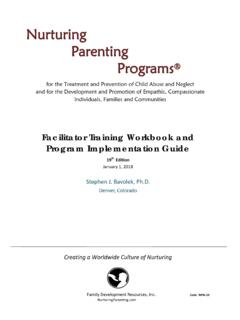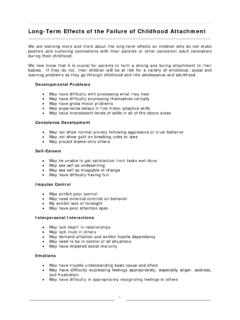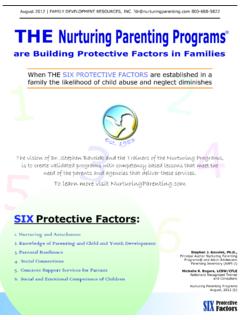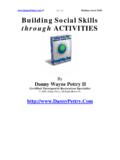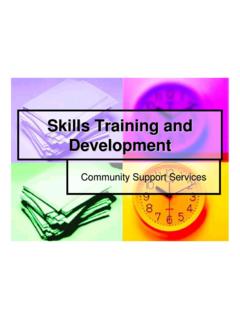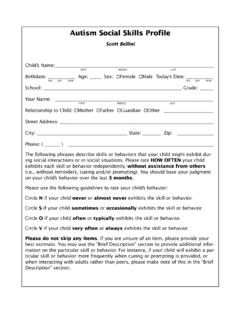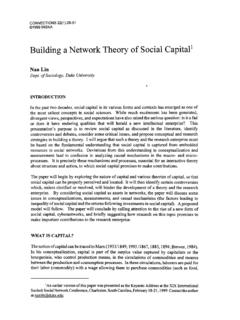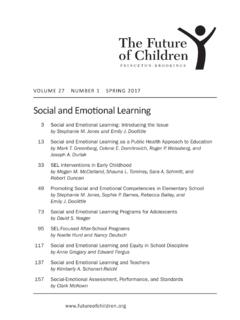Transcription of Building Nuturing Parenting Skills in Teenage …
1 Building Nurturing Parenting Skills in Teenage parents Stephen J. Bavolek, Juliana Dellinger-Bavolek, Final Report Winter, 1987. Family Development Resources, Inc. Sales: 1-800-688-5822; Training & Consulting: 828-698-7609; Introduction In the spring of 1986, a project designed to increase the nurturing Skills of Teenage parents was undertaken. The purpose of the project was to develop and validate a home-based/group-based intervention designed to treat the abusive Parenting practices of teen parents and to prevent the initial occurrence of abusive Parenting practices in teen mothers identified as high risk for physical and emotional maltreatment or neglect. The overall goals of the intervention were to: 1. Increase the nurturing Parenting Skills of Teenage parents . 2. Increase the nurturing Parenting Skills of maternal and paternal grandparents. 3. Enhance the positive self-esteem and self-concept of the teen parents through self-awareness and success experiences. In developing the Nurturing Parenting Program for Teenage parents and Their Families, the previous work and research completed by this author was used as the basis for program development.
2 The four Parenting constructs identified by Bavolek (1978) and proven successful as the basis in other interventions (Bavolek & Comstock, 1983;. Bavolek and Bavolek, 1985) established the framework of the program. Construct A: Inappropriate Parental Expectations of Children Construct B: Lack of an Empathic Awareness of Children's Needs Construct C: Strong Belief in the use of Corporal Punishment as a means of Disciplining Children Construct D: Reversing Parent-Child Family Roles Methodology Development of Prototype I. Activities were developed from the identified goals of the program. Parenting activities were taken from the Nurturing Program for parents and Children Birth to Five Years and modified for a teen parent population. Self-awareness activities for teens were developed from the known research identifying at risk characteristics of teen parents and from the author's experiences. Prototype I of the program consisted of twenty, 2 hour group-based sessions, and forty, 1 hour home-based sessions.
3 Separate grandparent programs were developed for implementation in a group-based setting or a home- based setting. The group-based setting consisted of 10 sessions meeting every other week with the teens. The home-based program was conducted with the teen parents and grandparents together. The following format was utilized throughout the field testing of the program: Home-Based Program Format Parent Activities Icebreaker and Check-In (20 minutes). Teen parents and grandparents respond to an icebreaker, check-in regarding their week, and review home practice assignments. Concept Presentation (40 minutes). Teen parents , grandparents, and the home visitor engage in role play, discussing new ideas, viewing a filmstrip, expressing self through art, and relaxing in a visualization. 1. Family Nurturing Time (30 minutes). Teen parents , their children, grandparents, and the home visitor engage in activities, games, song, and snack. The home visitor supervises, models, and instructs teen parents on practicing new Parenting Skills .
4 Home Practice and Hug (3 minutes). Teen parents , grandparents, and the home visitor discuss the home practice exercise for the next session. Each session ends with a family hug which includes the children. Family Activities Infant Activities (birth to 15 months). Activities include finger plays, infant massage, and play. Toddler Activities (15 months to 3 years). Activities include finger plays, hand-eye motor, large muscle movement, sensory discovery, language development, and child massage. Preschooler Activities (3 to 5 years). Activities include songs, large muscle exercises, art activities, and discussion using puppets. Group-Based Format Parent's Program Icebreaker and Check-In (20 minutes). Teen parents respond to an icebreaker, check-in with their peers regarding their week, and review home practice exercises. Concept Presentation (50 minutes). Parenting Skills and behavior management techniques are learned through A/V programs, discussions, and role play. Family Nurturing Time (30 minutes).
5 Teen parents and their children engage in activities, games, song, dance, and snack. Staff supervises, models, and instructs teen parents on practicing new Parenting Skills . Family Nurturing Time ends with a family hug. Discussion (50 minutes). parents learn about self-awareness, self-growth, and nurturing self through discussion, role play, and art activities. Home Practice and Hug (3 minutes). Teen parents meet as a group and discuss the home practice exercise for the next session. Each session ends in a group hug. Children's Program Infant Activities. The facilitators employ activities which include finger plays, infant massage, and play with infants while parents attend their group. parents and children meet for 30 minutes during Family Nurturing Time where families practice songs, games, and infant massage techniques. Toddler Activities. Children 15 months to 3 years engage in games, songs, large muscle movement, sensory discovery, language development, and child massage while parents attend a separate group.
6 During Family Nurturing Time, parents and children engage in fun and cooperative family activities. Preschooler Activities. Children 3 to 5 years participate in a schedule of activities which include Hello Time, Big Motor Time, Circle Time, Art Time, Puppet Time, and Closing Group Hug. Like the infants and toddlers, preschoolers get to spend 30 minutes with their parents having fun and playing games during Family Nurturing Time. 2. Selection of Field Test Sites Written and verbal requests were sent to agencies throughout the country interested in participating in the research. Agencies who had been using Nurturing Parenting Programs were contacted as well as departments of mental health, social services, and private, non-profits. The requirements for participation were: a) implement the program as designed; b) gather pretest and posttest data from the families; c) completion of weekly process evaluation questionnaires by the program facilitators: and, d) identify and record changes made in the delivery of the service, and/or content of the program.
7 A total of 10 sites agreed to participate in field testing the program. The following agencies contributed time and staff to the research: Family Support Project Developmental Services, Inc. Clarice Katz Michele Theunissen Waukesha, WI Mt. Pleasant, MI. Father Patrick Jackson House Charlotte County DSS. Shannon Richards Carolyn M. Baker Ann Arbor, MI Charlotte, VA. Citizens Committee on Child Abuse Kenquest House Ginger Jantz Kelly Fortino Covington, KY Grayling, MI. Cabinet for Human Resources DFS Child Crisis Center East Valley Carolyn Hummell Rory Gilbert Louisville, KY Mesa, AZ. Laramie County DPASS Florence Crittendon Services Suzanne Knoettgen Diane Danielesky Cheyenne, WY Erie, PA. Field Testing of Prototype I. Teen parents (mothers and fathers of the children) and their parents (the baby's grandparents) were recruited for participation in the program. Participants were asked to make a commitment to attend all sessions. Pretest and posttest data were gathered from the participants.
8 Facilitators were asked to make recommendations for changes in the activities, content, or program requirements. Development and Field Testing of Prototype II. Changes to the program activities and instructional aids were made based on the pretest and posttest data and facilitator evaluation and comments. Prototype II of the Nurturing Parenting Program for Teenage parents and Their Families was developed. The same sites involved in field testing Prototype I were requested to field test Prototype II. Development of Prototype III. After making the second round of field testing, Prototype III of the program was developed. Comments, evaluation information, pretest and posttest data were utilized in the development of the third prototype of the program. 3. Pretest and Posttest Assessment The following four inventories were utilized in gathering pre and posttest data from the teen parents and grandparents: Table 1. Data Gathering Inventories The Adult-Adolescent Parenting Inventory (AAPI).
9 The AAPI is an inventory designed to assess the Parenting and child rearing attitudes of adults and adolescents. Responses generated from the inventory measure degrees of acceptance of appropriate expectations of children, empathy toward children's needs, belief in the use of corporal punishment, and parent-child role clarification. The Nurturing Quiz AN informal criterion-referenced inventory designed to measure knowledge of appropriate behavior management strategies. Family Social History Questionnaire (FSHQ). The Family Social History Questionnaire was utilized to gather information about family members prior to treatment. Program Evaluation Forms parents and adolescents completed program evaluation forms at the completion of each weekly session and following the completion of the entire 12-week treatment program. Results Population Demographics The Nurturing Parenting Program for Teenage parents and Their Families was validated by twelve agencies providing parent education to Teenage parents throughout the country.
10 A total of 178 teen parents (94% moms; 6%. dads) participated in home-based and group-based programs. Eighty percent (80%) of the teen parents were single. Seventy-five percent (75%) indicated they were Caucasian; 18% indicated they were Black; the remaining teens indicated they were Hispanic (4%) and American Indian (3%). No single religious preference was dominant among the teens. Eighty-eight percent (88%) indicated they were unemployed. Thirty-three percent (33%) indicated their family income was below $ Twenty-one percent (21%) of the teens indicated they were abused or neglected by their mother; 22% indicated they were abused or neglected by their father. Of this group, 4% indicated they were sexually abused. In addition, 47% of the teens indicated they have been abused by their boyfriends and/or girlfriends. Throughout the entire field test period, only one agency was capable of implementing the corresponding group-based program for grandparents (the parents of the teen parents ).
